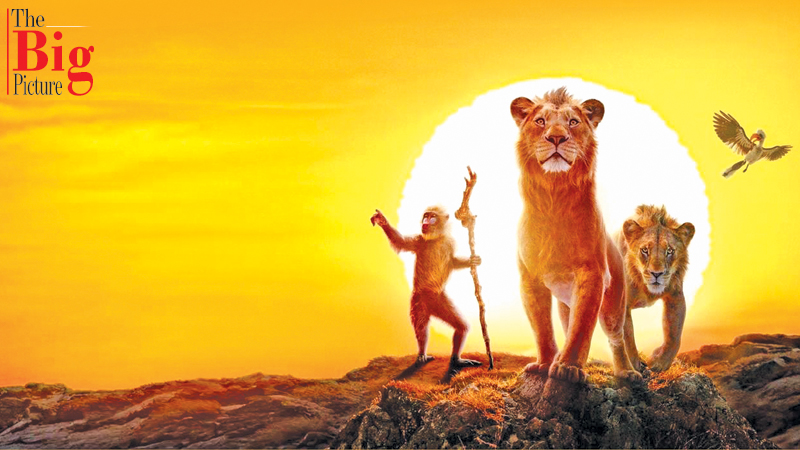 We all love tales revolving around underdogs. The idea of an unlikely and reluctant leader who comes to power has its own irresistible charm. Many authors, scriptwriters and filmmakers have cashed upon this idea and have come up with a handful of productions which have kept readers and the audience mesmerised for years.
We all love tales revolving around underdogs. The idea of an unlikely and reluctant leader who comes to power has its own irresistible charm. Many authors, scriptwriters and filmmakers have cashed upon this idea and have come up with a handful of productions which have kept readers and the audience mesmerised for years.
Disney’s latest addition to its roaring ‘The Lion King’ success seems to be a perfect fit for this. The story revolves around Mufasa, one of the most recognisable animated characters in the history of Disney animation classics. However, even though the film gets off to a roaring start it is soon lost in emotions and inconsistencies.
 The film opens with Simba, ruling the Pride Lands with bravery, justice, fairness and love. He continues the legacy of his father, Mufasa. He leaves his daughter Kiara in the care of Timon and Pumbaa as he rushes to assist his troubled wife Nala. Soon after, the sage baboon, Rafiki, joins the three to tell Kiara the story of her courageous grandfather Mufasa, who went against all odds to achieve the impossible.
The film opens with Simba, ruling the Pride Lands with bravery, justice, fairness and love. He continues the legacy of his father, Mufasa. He leaves his daughter Kiara in the care of Timon and Pumbaa as he rushes to assist his troubled wife Nala. Soon after, the sage baboon, Rafiki, joins the three to tell Kiara the story of her courageous grandfather Mufasa, who went against all odds to achieve the impossible.
The movie defines the well-known proverb “blood is thicker than water” since every character who adheres to it ends up being an enemy. It answers many questions that remain a mystery in ‘The Lion King’ – especially why Scar has been exiled from pride. ‘Mufasa: The Lion King’ is a visually stunning prequel which traces the origin of Mufasa as he journeys to become the king of the Pride Lands. It also sheds light on his troublesome relationship with Simba’s wicked uncle, Scar.
Mufasa, born to Masego and Afia, is separated from his parents after being carried away by the floods. He is saved by Taka, the son and heir to the throne of Obasi and Eshe, who rules the kingdom. The reunion of Princess Nala, her spy hornbill Zazu, and Rafiki is actually a lovely union of their themes and interpersonal relationships.
One of the most significant aspects of this prequel is how it emphasises how Taka got his nickname, Scar. Though he was seen as a purely evil character in ‘The Lion King’ when he led Mufasa to his death, broke Simba by believing that he is responsible for his father’s death, and turned over the pride to the hyenas, ‘Mufasa: The Lion King’ gives him a humanised touch. We actually emphasise with Taka who seems to be a foil for Mufasa.
As Mufasa horns his skills by hunting with the lionesses, Taka is groomed to become the future king by simply lying around majestically doing practically nothing. This turns against him when he encounters Kiros, the leader of the white lions, and is unable to fight back and defend them. He also fails at channelling his romantic feelings for Sarabi and naturally, when she turns to Mufasa, he is struck by uncontrollable jealousy and is blinded by a means of taking revenge by joining forces with Kiros to avenge the lion who caused Kiros’ son’s death.
Just like the first movie, this prequel too relies on its songs and music to carry its enchantment forward. However, though it has its lure, ‘Mufasa: The Lion King’s scores, lyrics and singing can hardly match ‘The Lion King’. However, much like ‘The Lion King’, ‘Mufasa: The Lion King’ too engages these to bring the story forward and undercover hidden meanings. For example, it highlights how bored Mufasa felt it was to be a single child and always wanting a brother. This is succinctly captured by ‘I Always Wanted a Brother’; the song also acts as a marker of Taka’s character arc and sets the stage for his betrayal later.
 The 1994 animated classic may have topped the box office for its inimitable storytelling techniques, iconic music, and stellar voice performances as well as how each and every character has been fleshed out in a creative and unique manner. Since the bar has been set so high, it is understandable that another movie made to run along with the series will find it difficult to meet these standards.
The 1994 animated classic may have topped the box office for its inimitable storytelling techniques, iconic music, and stellar voice performances as well as how each and every character has been fleshed out in a creative and unique manner. Since the bar has been set so high, it is understandable that another movie made to run along with the series will find it difficult to meet these standards.
The film’s themes of unity, leadership, brotherhood, and legacy are prevalent, but the narrative falls short of the grandeur of its visuals. Despite its ambitions, the script frequently feels forced and lacks the original’s narrative power. Although deserving, Lin-Manuel Miranda’s score does not meet up to the enchantment of Tim Rice and Elton John’s original works in the form of timeless hits like ‘Can You Feel the Love Tonight’, ‘HakunaMatata’, and ‘Circle of Life’.
The voice acting is stellar with actors like Aaron Pierre, Kelvin Harrison Jr., Mads Mikkelsen, Billy Eichner, Seth Rogen and Tiffany Boone rendering their voices to the prominent characters. A stunning visual feast, ‘Mufasa: The Lion King’ transports viewers to a masterfully rendered world and is a movie which is worth watching though we feel that there could have been a better ending.







